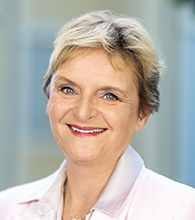Digitalization and its consequences for education and training in controlling
An interview by the International Association of Controllers (ICV) with the Board Members of the CA controller akademie: Digitalization already takes effect in all areas of life and work; also for controlling it means changes and a need for rethinking. Not only the controllers themselves are affected, but also the providers of education and training in this area. We talked to Dorothee Deyhle and Dr. Klaus Eiselmayer, Board Members of the CA controller akademie, about how they deal with the new requirements and how they experience the change in the daily practice of the CA.

Brigitte Dienstl-Arnegger (ICV): What does digitalization mean for you as responsible for the CA controller akademie?
Dr. Klaus Eiselmayer: First and foremost, it means sensitizing our customers and preparing them for the subject of digitalization with suitable offers, which for many means having to jump on a train that has already set off, which is why you can’t stay lying on the tracks – please allow me this drastic comparison. Exactly for this reason, digitalization has been part of our training programs for quite some time.
Dorothee Deyhle: For us as a training institute, it is also very important to encourage our participants. We want to help them to position themselves well for the coming challenges with the right know-how. We want to encourage our participants to see digital transformation as an opportunity to successfully transform themselves with new skills. We help them to take advantage of the new opportunities created by the change and to grow into new exciting tasks.
Within our training formats today, we offer our customers a range of digital learning opportunities.
Eiselmayer: Under the name “CA on Air” we conduct numerous video trainings, live webinars or, with management reports, an accompanied online training. Our seminar “Level I – Controller’s Best Practice” is also available in blended learning format. Here you can complete the curriculum of 5 days by editing the training material of two days in our learning environment online at your free time, no matter where you are. Self-tests and consultations with the trainer support your learning. This is followed by a 3-day classroom seminar, in which the practical application of the content is deepened and the aspects of presentation, group performance and moderation are treated and trained.
Dienstl-Arnegger: What does digitalization mean for the content of controlling? How do you deal with this as a provider of training and further education in practice?
Eiselmayer: This question has moved many of our participants, so in 2016 we started a seminar tour (“Controlling on the Move”) on digitalization: “Controlling excellence in the age of digitalization” led repeatedly to 14 cities last autumn to discuss the topic with the responsible controllers and managers.
Deyhle: Above all, digitalization requires better knowledge in the area of IT, Internet, analytics, programming, statistics, etc. We believe that the expansion of skills in these areas is extremely important. That is why our theme world “information management” is constantly growing in diversity. It deals with the facets of digitalization: data acquisition, business intelligence and Big Data, as well as data analysis, predictive and advanced analytics, or management information design, such as design of dashboards. Here our participants have the opportunity to make an apprenticeship with very different qualification emphases for the Certified Information Manager CA.
In order to successfully cope with the digital transformation, existing business models must be reviewed on a sustainable basis and agile working methods and innovation must be promoted. For this we have e.g. special seminars in the program, such as Effectuation, Lean Management or Agile Project Management. And in 2018 there will be a symposium on business model development and innovation for the first time.
As a provider of training and further education, we are constantly challenged to adapt our product portfolio with regard to current developments, also in the constant exchange with our customers about their current and future needs. In order to provide specialist and management-relevant knowledge and to advise companies well, we must stand by the “pulse of the times” and help drive the development in corporate management. But this also means being well connected and having a continuous exchange of experience with other organizations, universities, the International Group of Controlling IGC and especially with our partner, the International Association of Controllers ICV.
Dienstl-Arnegger: What new skills / abilities / competences does a controller need to learn or purchase?
Eiselmayer: Controllers have sometimes very different CVs. Many have studied business administration, business informatics or industrial engineering. Depending on the content of the study program and the practical experience gained, accounting, modern controlling applications, information management, corporate management and / or social skills should be expanded / supplemented. For this we have set up five own theme worlds at the CA controller akademie.
Some controllers are already practitioners coming from manufacturing, sales, R & D or banking education, looking for taking on a new challenge. Here, the need for basic controlling concepts and their practical application is slightly different.
Deyhle: Controlling is still a process that requires people to work together. New technical possibilities and the automation of standard tasks give controllers freedom and thus the opportunity for further development. It will be important to use these and to expand their competencies. So to become a Business Partner 4.0 who can be not only controller, but also accountant, IT pro, analyst, moderator and coach, and also strategic consultant, change agent and innovator.
Dienstl-Arnegger: Are there training and further education contents that are outdated by digitalization?
Eiselmayer: Here I would answer with a clear “yes and no”. In my consulting practice, I meet organizations that are “mature” in terms of a controlling life cycle or those still at the beginning. In the field of non-governmental organizations (NGOs), in research institutions or spin-offs from the “state enterprise” I have worked for some organizations / companies that introduce controlling. There are topics in need there that others have already taken for granted.
Digitalization eliminates the need to manually create standard reports. Some companies have successfully implemented this and already have a “digital boardroom” on their own. However, in many companies reports are still (laboriously) created with Excel.
At the moment it turns out that some education and training contents have become less important, which I attribute as a change of time. The major changes due to digitalization are still to come.
Dienstl-Arnegger: From your point of view, is there any point in time or event that is an incision / kick-off for digitalization in controlling? Or is the development for the controllers a steady?
Dienstl-Arnegger: Where will be controllers / controlling in ten years compared to today?
Eiselmayer: In ten years, the discussed topics will be implemented on a large scale. Routine activities will be eliminated, reports will come automatically. Monthly reports will still be available, but the focus will be on analyzing real-time data and forecasts. One component of this is Industrie 4.0 and the increasing networking of all market participants.
Deyhle: Here, too, the general question arises for me: Where will be the man and the machine then? What potentials, opportunities or risks will have been created by technological developments and by extremely powerful and very fast-learning machine intelligences? In any case, they will change our job requirements, but also us as humans and our society. Our VUKA world is rounding crazy fast and is making forecasting for the future harder and harder.
Dienstl-Arnegger: What do you give the controlling newcomer for their way?
Eiselmayer: I wish them curiosity and interest in new business models, new tools and visionary ideas. We face huge challenges when we accept them: pollution, climate change, renewable energies, mobility concepts, mega-cities, combating hunger and poverty, access to education for all people, etc.
Deyhle: For all future demands and changes, innovation and creativity, social skills, emotional intelligence and ethics will be even more important than ever before. We should stay flexible and open and be ready to learn new things for life.
Eiselmayer: When artificial intelligence and robots take over work in the future, the next challenges are only waiting to be answered…
Source: International Association of Controllers (ICV), Klaus Eiselmayer, Dorothee Deyhle



